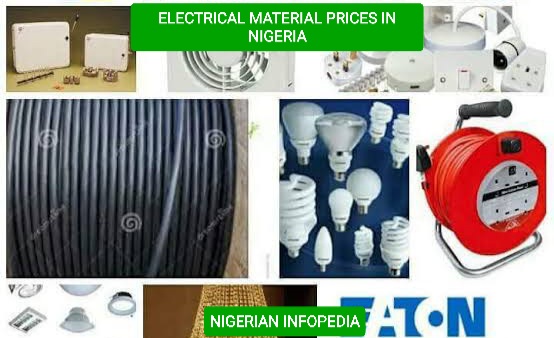Latest Prices of Electrical Materials in Nigeria (2024)
Electrical materials are necessary for electrical wiring, fittings for homes and it can be utilized for a range of functions. The most essential of which is managing current flow through a series of connecting wires, sockets, plugs and meters. Having all that in consideration, let’s look at the Nigerian market and see how much electrical materials are priced, followed by a look at some of the factors that influences its pricing.

CURRENT PRICES OF ELECTRICAL MATERIALS IN NIGERIA (2024)
Today, modern building materials include a wide range of electrical fitting materials aside cement and molding blocks. From cables to sockets and other electrical components, we’ve got you covered. Knowing the costs of these electrical products might help you create your budget and estimate for your building task. The problem has always been to know the latest electrical material prices which has made many wander around the market looking for it. Following our investigation, we compiled the following list of electrical materials and their prices this month:
The following are Nigeria’s current electrical material costs for 2023:
- 4 armored cables with a 50 mm diameter will cost between ₦7,800 and ₦8,500 per meter in 2024.
- The cost of four armored wires with a diameter of 16 mm is between ₦3,700 and ₦5,000 per meter.
- A 100 amp changeover switch costs between ₦67,000 and ₦75,000 in Nigeria right now.
- In Nigeria, a 100 amp TP and N switch currently costs between ₦35,000 and 40,000 Naira.
- A distribution board (D12) in 2024 will cost between ₦55,000 and ₦65,000 in Nigeria.
- A 6 x 6 cooking unit can cost anywhere between ₦6,500 and ₦8,500 on the market today.
- 25 mm PVC dignity pipe costs between ₦12,000 and ₦17,000 per bundle at the moment.
- The cost of a bundle of 20 mm PVC dignity pipe is from ₦11,000 to ₦13,000.
- Currently, standard energy-saving lights (1 x 36 watts) cost between ₦6,000 and ₦8,000.
- High-quality traditional energy-saving lights (1 x 36 watts) currently cost between ₦17,000 and ₦19,000.
- Light fittings (4 x 18 watts) cost between ₦9,500 and ₦12,000 in Nigeria these days.
- Bulk-headed light fixtures cost between ₦4,500 and ₦6,000 at the moment.
- The cost of a chandelier light fixture presently ranges from ₦35,000 to ₦90,000.
- DP switches cost between ₦4,500 and ₦5,500 in Nigeria’s current electrical materials market.
- A 13 amp socket can cost anything between ₦1,500 and ₦2,100.
- A 5 amp socket will set you back anywhere from ₦1,100 to ₦1,400.
- A three-gang one-way switch costs between ₦3,700 and ₦4,500.
- A two-gang two-way switch costs between ₦3,500 and ₦4,000.
- You should expect to pay between ₦2,100 and ₦3,100 for a single gang 2-way switch.
- A single gang 1-way switch costs between ₦800 and ₦1,100.
- A 1.5 mm single-core (G.R.Y.) cable costs between ₦50 and ₦100.
- 2.5 mm single-core (G.R.Y.) cable costs between ₦15,000 and ₦20,000 per coil/100.
- Between ₦25,000 to ₦30,000 is spent for a coil/100 of 4 mm single-core (G.R.Y.) cable.
- 6 mm single-core (G.R.Y.) cable costs at least between ₦30,000 and ₦37,000 in Nigeria.
Please keep in mind that the pricing of electrical materials stated above are estimations and are likely to modification. This post is solely for information – based purposes, and we recommend that you check the store to validate any pricing given.
Nevertheless, let’s look at another important thing which is the variables influencing the costs of electrical materials.
FACTORS AFFECTING ELECTRICAL MATERIAL PRICES IN NIGERIA
If you’ve ever purchased electrical materials, you’ll know that their prices change frequently. “Why do these commodities’ prices vary so much?” is a query that requires an explanation. If this issue has been bothering you, we may have some answers for you. Following are some of the elements that influence the pricing of electrical materials in Nigeria, according to our findings.
BRANDS
There’s no denying that certain brands are more well-known than others. The pricing of their items are affected by the varied brand names. Products from well-known names are generally always more expensive than those from lesser-known companies. This is primarily due to the fact that these well-known businesses have built a solid reputation in the marketplace.
SEASON/TIME
Another key factor that influences the pricing of electrical materials is time. Have you ever observed that certain materials become more expensive at various periods of the year? As when the seasons advance, these commodities grow less expensive. That is how the passage of time affects market pricing. You can figure out the optimal time to buy these things by looking at the cost of these commodities in relation to the seasons.
TARIFFS ON IMPORTS
Almost all of the electrical materials we buy in Nigeria come from abroad. As a consequence, the cost of import duties has an impact on their prices. The product will be more expensive if the import duty is higher, and vice versa.
The import tariffs play a major by determining the price that would by sold after the importation of the products.
LOCATION
The cost of materials is also determined by where they are purchased. If you buy them in a location with a higher level of living, you may expect them to be expensive. On the other contrary, you can get the identical materials for a far lower price somewhere else.
Moreover, the location plays an important role in determining the cost of electrical materials in that buying an electrical product from an area that is near the source market won’t be the same as buying from far away.
CONCLUSION
Electricity is now a vital part of our daily life. Nowadays, it’s nearly difficult to construct a construction without taking electricity into account. As a result, you’ll need to account for the cost of the electrical items you’ll need.
Today’s building materials include a wide range of electrical materials. From cables to sockets and other electrical components, we’ve got you covered. Knowing the costs of these goods might help you plan your budget and budget for your project.
“How much do electrical materials for building cost in Nigeria?” you might wonder. We hope you were able to discover the answers through this article. There was also some further info regarding electrical materials and the elements that influence the cost.

